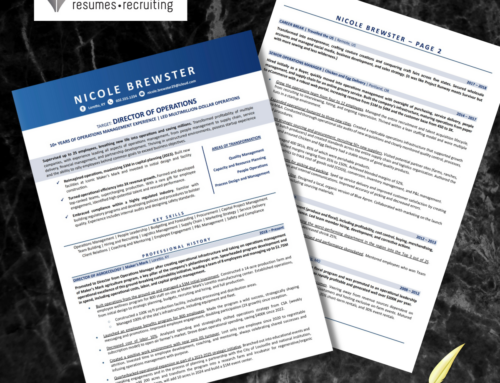If you’re a federal employee right now, you’re probably feeling a little uneasy—and for good reason. This isn’t just another round of budget talks or a temporary hiring freeze. We’re looking at the real possibility of massive federal downsizing, and no one is sure what’s coming next. Here’s what Reuters has to say.
For years, a government job meant stability. Now? Not so much. And if you’ve been watching the headlines, you might be wondering: Should I start preparing for a move to the private sector?
If the answer is even maybe, there’s one thing you need to do first—fix your resume.
Because here’s the hard truth: Your federal resume, in all its 10-page, acronym-filled glory, won’t cut it in the private sector. The corporate world doesn’t care about job series numbers, GS levels, or how many policy memos you wrote in 2017. What they do care about? Results. Efficiency. Impact.
That’s where you need to shift your focus. But don’t worry—you don’t have to start from scratch. Your experience is valuable, and with the right adjustments, your resume can position you as a top private-sector candidate. Here’s how to make the transition.
Why Your Federal Resume Won’t Work in the Private Sector
Federal resumes aren’t bad—they’re just designed for a different audience. They tend to be:
- Way too long – Look, I get it. The government loves documentation. But that 10-page beast of a resume? Private-sector hiring managers will never read it.
- Packed with government-speak – GS levels, series numbers, and acronyms galore. If it sounds like classified intel, it’s time for a rewrite.
- Focused on duties, not achievements – Private employers care about impact, not just responsibilities.
Meanwhile, private-sector resumes are:
- Concise – 1-2 pages, max. Anything longer gets the “we’ll read this later” treatment (spoiler: they won’t).
- Strategic – Less “I followed procedures” and more “Here’s how I made things better.”
- Results-driven – Because “Managed a team” doesn’t sound nearly as impressive as “Led a team that improved efficiency by 30%.”
So, if your current resume looks more like a government audit report than a compelling career summary, let’s fix that.
How to Convert Your Federal Resume for the Private Sector
1. Trim It Down—No One Wants a Novel
Your federal resume is packed with details, but let’s be real—no one needs to know about that one policy update you reviewed in 2014. The private sector is all about efficiency, so aim for 1-2 pages focusing on the last 10-15 years of experience.
✅ Before (Federal Resume Style)
“Served as a GS-13 Contracting Officer, overseeing federal procurement processes and ensuring compliance with FAR and DFARS regulations across multiple agencies.”
✅ After (Private Sector Resume Style)
“Directed $500M+ procurement operations, strengthening compliance by 40% and renegotiating vendor contracts to reduce costs by $10M.”
See? Shorter, cleaner, and focused on impact, not red tape.
2. Drop the Government-Speak
If your resume reads like a policy manual, it’s time for a translation. Most private-sector hiring managers have no idea what GS-13, FAR, DFARS, OMB Circular A-123 mean—and they’re not going to Google it.
✅ Before: “Developed and implemented interagency policies in accordance with OMB directives, ensuring alignment with federal mandates.”
✅ After: “Created and enforced company-wide policies to improve compliance and streamline operations.”
One of these sounds like a human wrote it. Aim for that one.
3. Focus on Results, Not Just Responsibilities
Private-sector employers don’t care what you were assigned to do. They care what happened because you did it.
✅ Before: “Responsible for managing cybersecurity initiatives and overseeing security protocols for a federal agency.”
✅ After: “Led cybersecurity initiatives that blocked 500K+ attempted breaches, improved threat response times by 60%, and ensured compliance with evolving security standards.”
Numbers are your best friend here. If you saved time, increased efficiency, cut costs, improved security—say so.
4. Rebrand Your Skills for the Private Sector
You have valuable skills—the trick is presenting them in a way that resonates with corporate hiring managers. Here’s how some common federal terms translate into private-sector language:
| Federal Terminology | Private-Sector Equivalent |
|---|---|
| Policy Analysis | Business Strategy |
| Program Management | Project Management and/or Operations |
| Stakeholder Engagement | Stakeholder Engagement (yes, this is the same!) |
| Budget Execution | Financial Planning & Analysis |
| Compliance and Regulation | Risk Management and/or Governance |
| Personnel Oversight | Team Leadership and/or People Management |
✅ Before: “Led a team of GS-14 analysts in reviewing OMB circulars related to fiscal policy.”
✅ After: “Managed a team of senior financial analysts to evaluate policy impact, identifying $15M in potential savings through improved cost analysis.”
✅ Before: “Oversaw federal budget execution and compliance for multimillion-dollar projects.”
✅ After: “Optimized budget execution for $250M in projects, reallocating resources to increase operational efficiency by 20%.”
✅ Before: “Managed high-level stakeholder engagement with interagency partners.”
✅ After: “Built strategic partnerships with Fortune 500 executives, leading cross-functional initiatives that drove $50M in new investment.”
5. Optimize for Applicant Tracking Systems (ATS)
Unlike USAJOBS, where a human actually reads applications (eventually), the private sector relies on ATS software—the application that most talent acquisition teams use.
✅ How to influence hiring managers:
- Use keywords directly from job descriptions. (If they want “cross-functional team leadership,” don’t say “interagency collaboration.”)
- Stick to standard job titles. (“Management Analyst” might mean something in government, but “Business Analyst” is more recognizable in corporate.)
- Keep formatting simple—no fancy tables or graphics. (Robots don’t appreciate design skills.)
Having a federal job on your resume doesn’t make you less competitive—it actually gives you a huge advantage. You just need to package your experience in a way that private-sector employers understand and value.
If you’re ready to escape the uncertainty of federal employment and land a job in the private sector, your resume is the first step. And if rewriting it sounds about as fun as sitting through a three-hour budget meeting, don’t worry—I’ve got you.
Need help turning your federal resume into a private-sector powerhouse? Let’s make it happen.
FAQs About Federal-to-Private Resumes
Q: How do I explain my transition to the private sector?
A: Frame it as a logical career move. Focus on transferable skills like leadership, strategic planning, and problem-solving that apply anywhere.
Q: Do private employers recognize federal job titles?
A: Not always. Use private-sector equivalents where possible —“Operations Manager” instead of “GS-14 Program Analyst,” for example. Also, if you’d like to read more about career transitions, this article may help.
Q: Should I include my security clearance?
A: Only if it’s relevant (defense, cybersecurity, etc.). Otherwise, it won’t matter to most employers.












